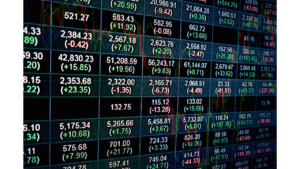For several decades our planet has provided businesses with a perfect backdrop – globalisation, technological advance, credit expansion, and the dismantling of trade union influence gave business owners an unprecedented tailwind. This is about to end. The planet is telling us through climate change that we have taken more than we should out of our air, soil, and water and instead given back things that make it sick.
Climate change is already here and affecting us. The world we live in will not miraculously revert back to how things were – at best we can hope to slow the decline and hopefully at some stage in the future manage to bring it to halt. To not only survive, but thrive despite climate change, your business will have to adapt to this new situation. This means rethinking your choices. If you as a business think we have a sustainability problem, it is because we are running out of resources, and if resources are about to become more limited your business model will have to change.
At Rethinking Choices, we think climate change will bankrupt us before it drowns us, so the best thing you can do as an owner is to remain in business. You will have your employees, their families, your own family, and in the case of large businesses, whole communities which are all dependent on you successfully being able to navigate an uncertain future. When resources are more limited, expansion is more difficult, if not outright impossible for the aggregate, so the only way you can grow is by taking market share from competitors, or displace sectors which have become obsolete. It will no longer be possible to grow the cake, so your resilience will have to improve. By providing goods and services which are genuinely needed, you improve your chances of being successful. By innovating and experimenting inside the box, you will come up with new ideas and solutions, which do not rely on the previously mentioned cake growing in size. By cutting down on waste and using less resources, while still be able to deliver the same goods and services, your business becomes more robust, and your long-term chances of survival will improve.
It will become imperative to pare back leverage if you want to stay in business. This doesn’t only mean financial leverage – excessive operational leverage will put your business under stress when adverse events occur, and they will, and might even end up bankrupting you. While it is fairly obvious that a company which has borrowed more compared to one which has borrowed less, becomes more vulnerable in times of trouble, the issue with operational leverage is more subtle, but potentially just as destabilizing. A business which relies on timely deliveries of components from multiple suppliers in every corner of the world will inevitably be more fragile than a one which holds enough stock to be able to operate for some time if those deliveries fail to arrive. This could happen for several reasons, but climate change virtually guarantees that it will become more likely. Containers will get lost at sea because storms are now more frequent, rotating black-outs will become more common as there’s not enough energy at all times to allow everyone to freely use a commodity that has been too cheap for too long, and diseases like dengue fever and malaria are coming back in places we thought they were eradicated because it is now warmer than before, and that will make people sick more often. The point is that it doesn’t need to be a game changer like Covid or another global pandemic for everyone to realize how much the business world has relied on climate leverage to enhance performance. An operation which sources its supplies, or markets its products solely based on price, disregarding who they actually are and what they represent, instead of building long-term relationships with employees, suppliers, contractors, and customers will be the first one they let down if they are forced to prioritise. If you can successfully penetrate the supply chain and fully understand who your end-customers are, and what their actual needs are, you will be much better equipped to deal with the challenges of tomorrow. If you are able to meet their needs in their time of stress, they are much more likely to stand by you in your time of stress.
At every level, and in every part of your operation, resilience will become the key to success because the world is about to become a lot more hostile.
If growth and growth potential were the metrics by which to judge a successful company yesterday, tomorrow’s winners will be businesses which are perceived as being robust enough to be able to withstand even the most adverse of events. It is hugely important, because incidents we today think of as outliers will start happening with alarming frequency. As the insurance industry will be forced to step away from underwriting certain types of risks, or simply adjust premiums to levels which become totally unaffordable, you will have to be able to remain in business should it occur. The modern capitalist model doesn’t really function without insurance to protect us from the most adverse of outcomes, whether it’s insurance for buildings and machinery, underwriting of trade deals or health insurance. When this happens, there will be calls for governments to step in and offer the same level of protection, but they can’t. First of all, public capital should never ever be used to pick winners or losers, and blanket insurance for all the risks the industry has stepped away from would simply be too costly – even for sovereign states. Secondly, why should any state assume responsibility for things the private sector should reasonably be expected to sort out themselves ? If an insurance company refuses to provide protection in exchange for any level of premiums, there is probably a very good reason for them not doing so. This is after all their business model.
By adapting to the changing situation, you improve your chances of survival, because the most successful companies of tomorrow will be those who can provide products and services that are needed, not only wanted, and doing so without having to rely on excessive climate leverage. Thinking inside the box does just that. It doesn’t rely on mispriced externalities that pushes the true cost of your behaviour onto future generations. It will not enable you to take the benefits up-front against a promise of dealing with the adverse consequences of your actions at a later stage – which may or may not happen. At the end of the day, there is no coincidence that a growing number of enterprises are seeking shelter under Chapter 11-like protection to avoid having to deal with the economic impact from activities they have already monetized.
Again, resilience will be key to survive in a world running out of resources, because by surviving in this environment you make your greatest contribution to sustainability – you stay in business.
The world we are facing thanks to climate change is different than the one we were accustomed to, and it will rightly force us to rethink our choices – whether we like it or not. A business will no longer be able to operate by setting a return target and then utilize various kinds of levers to achieve it. Instead, by looking at its purpose, return is what you are going to get by doing all the right things.



